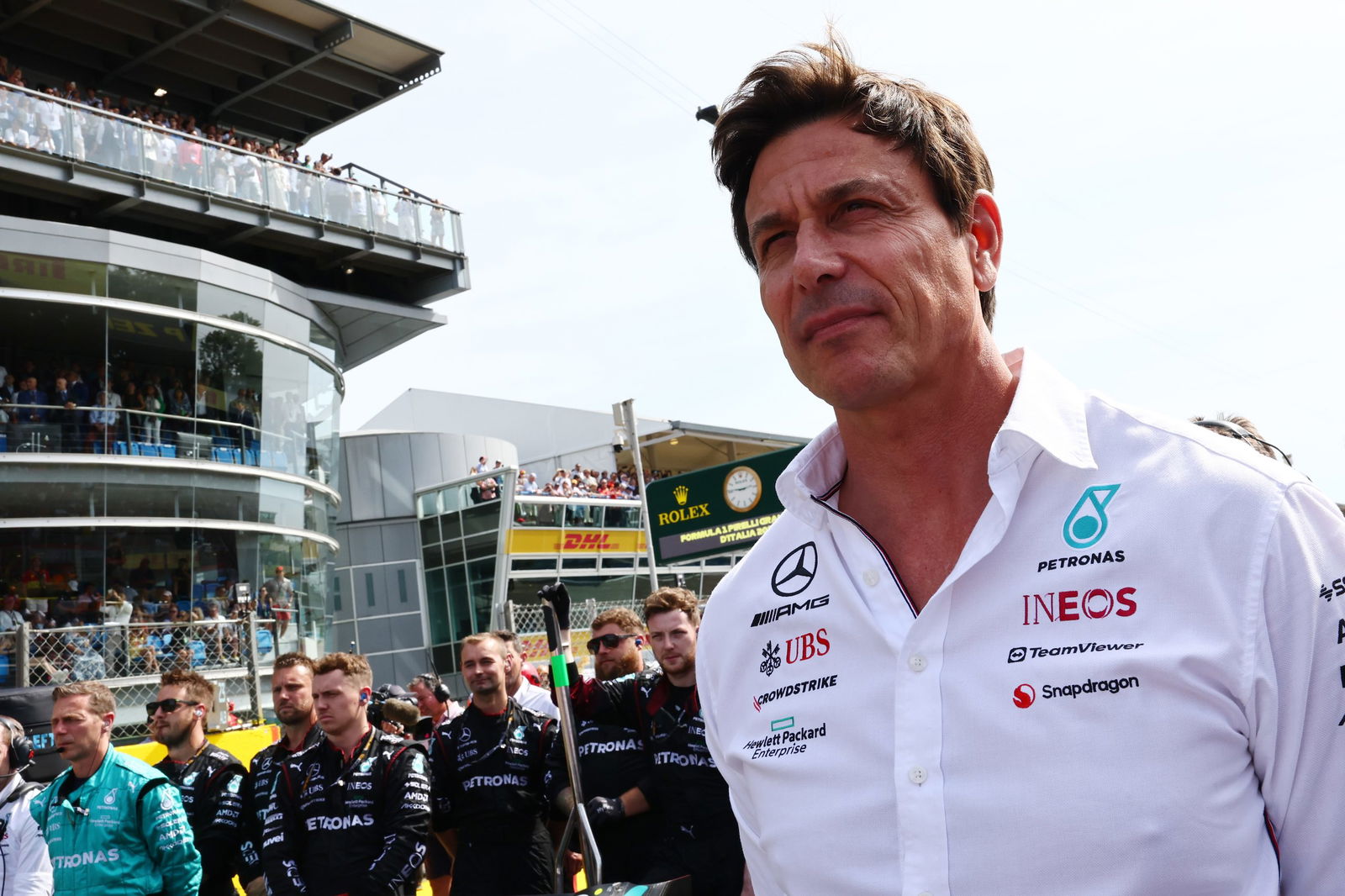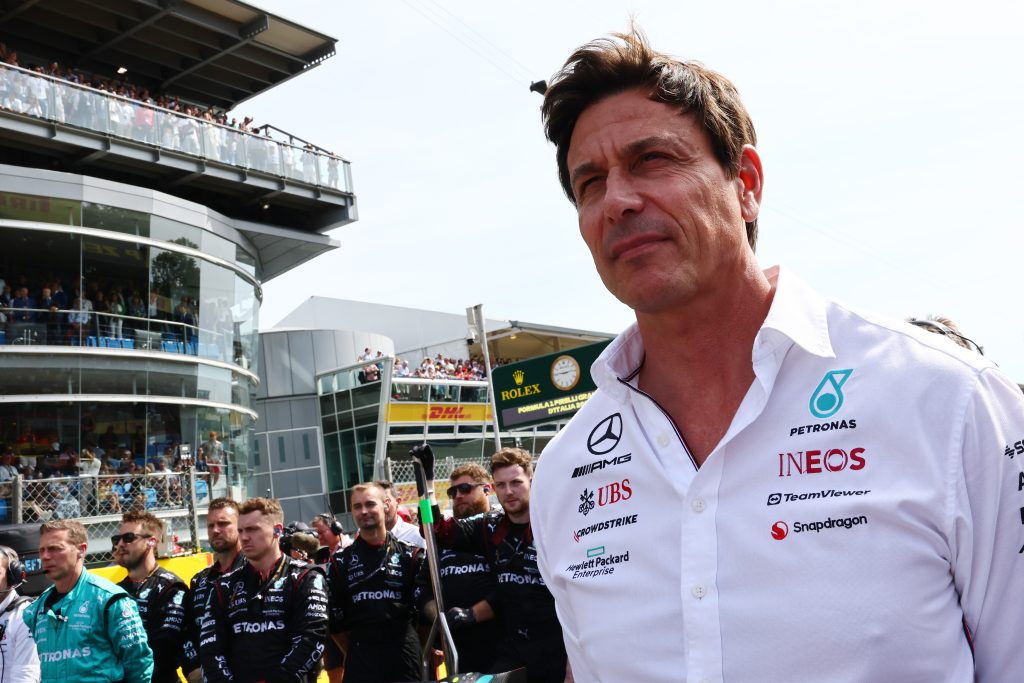

It still finished second in the constructors’ championship but was a mammoth 451 points behind Red Bull as its bitter rivals won its second consecutive teams’ title, whilst Max Verstappen was virtually unstoppable en route to a third successive drivers’ crown.
Here, Wolff reflects on the past campaign – highs, lows, learnings, and what lies ahead for 2024.
What was the proudest moment of the season? And what was the low point of the season?
Wolff: It’s difficult because there have been so many moments where we had high expectations and it didn’t pan out as we’d expected. Brazil was difficult because that was such a good race for us in 2022. We dominated the whole weekend last year, the sprint race and the main race, and then in 2023, the opposite was the case. So that was a bad moment. A good moment was Sunday night in Abu Dhabi. I never paid lots of attention to P2 and P3; we of course want to come P1. But then finishing P2 was emotionally and morally important for the team. That was a good moment.
What is something you learned from this season?
Wolff: We learned a lot. The races and the seasons that are difficult are the ones where you learn the most. And we always say, the days we lose are the days our competitors are going to regret because we learn the most. I think there are so many lessons that we learned as an organisation, as humans, but also technically that will be beneficial going forward. I wouldn’t be able to pick one out though because there are so many things that we have looked at that will help us progress over the next year.
What was in your eyes Mercedes’s best race this season and why?
Wolff: This might sound strange because we got disqualified, but Austin! We brought an upgrade package that worked, the car was performing well, and we were hunting down the leader. You could say, ‘Well, you were disqualified for a car that was too low’, but the genuine performance was there and that was an enjoyable weekend. I’ve always said that I’d rather have a fast car that we haven’t tuned in the right way. And obviously, you need to finish. But that was the best weekend overall, seeing that the correlation between the wind tunnel and the track was good.
After a season of highs and lows, how do you boost team morale?
Wolff: It’s good that we have an organisation where we support each other. It wasn’t always me that needed to boost the morale. Sometimes I needed the support and all of us together trying to pass the baton to each other to perform best at any given moment.
In reflection on the 2023 season, what were the key learnings or pivotal moments that you believe will shape the team’s approach and strategy heading into next season?
Wolff: During the year, we realised that our car was not operating in as stable a manner as we had predicted. That is perhaps because we didn’t develop it in the necessary window. It was clear that the interaction between chassis and tyres didn’t work perfectly. So, in that respect, this was the most important learning.
Do you think through this year there’s been more learned than the year before?
Wolff: I wouldn’t say lots more. It’s a constant learning process and next year, and in the years to come, there will be situations where we say ‘Well, we didn’t spot that.’ That was also true during the last 10 years where we won eight championships. You just have to constantly learn and develop. That’s a mindset we’ve always had.
What is the single most important factor in your performance strategy?
Wolff: I think there is no single most important factor. If you look at Formula 1, you may believe that there is a silver bullet, something that unlocks all the performance in the car, but there isn’t. It is all the work on the small items done properly. If you can put all of this together, then you have a winning package.
Was there a point where you thought finishing P3 may be more beneficial for the team this year?
Wolff: That’s a very good question because it’s not one-dimensional. From a mindset perspective, if you had asked me at the beginning of the season, I would have said it’s not very relevant whether we finish P2 or P3. The sporting advantage is that you have more wind tunnel time for next year. But then there is a financial component for all our staff in terms of bonuses. I need to look after everyone together with my senior management. And therefore, it is a very important component, even though, maybe from the sporting side, it is not so relevant. Having finished second in the world championship that evening (in Abu Dhabi), it felt great. I wasn’t expecting to have that feeling. You could see a boost of morale and emotion that was going through the team and that was important.
What is the biggest challenge you are facing going into the 2024 season?
Wolff: It’s to set the expectations right because we have a huge mountain to climb. There’s a team that is so successful and we have a big gap to close. At the same time, I believe we’ve taken some proactive steps to close that gap. Is it going to be good enough? I don’t know. But we’re going to see it in testing and then in the first race in Bahrain. I’m super excited. I’d like to start going now. It’s the stopwatch that’s going to tell us what job we’ve done.
And what are your thoughts on Mick Schumacher joining Alpine in the World Endurance Championship for 2024?
Wolff: Mick is a good driver and deserves to be in F1. Sadly, there isn’t any place free at present. Mick going into WEC, which is a world championship with a constructor like Alpine, is a very good opportunity for him. I believe he’s going to do a perfect job and it keeps him sharp racing and possibly helps him come back into Formula 1.





















Discussion about this post